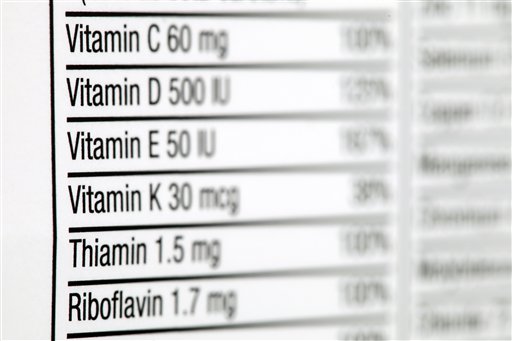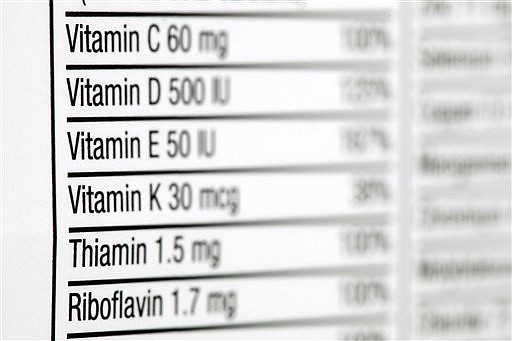Many take second look at vitamin safety
Friday, October 14, 2011
 The nutritional label of a box of multivitamins is photographed in Philadelphia on Thursday, Oct. 13, 2011. Two studies released in Oct. 2011 raised gnawing worries about the safety of vitamin supplements and a host of questions. Vitamins have long had a "health halo" - many people think they won't hurt and at worst might be unnecessary.
The nutritional label of a box of multivitamins is photographed in Philadelphia on Thursday, Oct. 13, 2011. Two studies released in Oct. 2011 raised gnawing worries about the safety of vitamin supplements and a host of questions. Vitamins have long had a "health halo" - many people think they won't hurt and at worst might be unnecessary.Two studies this week raised gnawing worries about the safety of vitamin supplements and a host of questions. Should anyone be taking them? Which ones are most risky? And if you do take them, how can you pick the safest ones?
Vitamins have long had a "health halo." Many people think they're good for you and at worst might simply be unnecessary. The industry calls them an insurance policy against bad eating.
But our foods are increasingly pumped full of them already. Even junk foods and drinks often are fortified with nutrients to give them a healthier profile, so the risk is that we're getting too much. Add a supplement and you may exceed the upper limit.
"We're finding out they're not as harmless as the industry might have us believe," said David Schardt, a nutritionist at the consumer group Center for Science in the Public Interest.
This week, a study of nearly 40,000 older women found a slightly higher risk of death among those taking dietary supplements, including multivitamins, folic acid, iron and copper. It was just an observational study, though, not a rigorous test.
Another study found that men taking high doses of vitamin E - 400 units a day - for five years had a slightly increased risk of prostate cancer.
Yet there is no clear evidence that multivitamins lower the risk of cancer, heart disease or any other chronic health problems. No government agency recommends them "regardless of the quality of a person's diet," says a fact sheet from the federal Office of Dietary Supplements. And vitamins aren't required to undergo the strict testing required of U.S.-approved prescription medicines.
Some fads, such as the antioxidant craze over vitamins A and E and beta-carotene, backfired when studies found more health risk, not less.
The best way to get vitamins is to eat foods that naturally contain them, said Jody Engel, a nutritionist with Office of Dietary Supplements. "Foods provide more than just vitamins and minerals, such as fiber and other ingredients that may have positive health effects."
Schardt adds: "It's virtually impossible to overdose on the nutrients in food."
Some folks may need more of certain nutrients and should talk with their doctors about supplements:
• Postmenopausal women regarding calcium and vitamin D to protect bones.
• Women planning on pregnancy regarding folate, or folic acid, to prevent birth defects.
• People over age 50 and vegans who may need vitamin B12. "As we get older, a number of us no longer produce enough acid in the stomach to extract the B12 in food," Schardt explained.
• Pregnant women, who may need extra iron.
• Breastfed infants and possibly other infants concerning vitamin D.
Vitamin D is a nutrient many of us may need to supplement. Last fall, the Institute of Medicine, a panel of scientists who advise the government, raised the recommended amount but also warned against overdoing it. People ages 1 to 70 should get 600 international units a day, older folks 800 units.
If you do need a supplement, beware: Quality varies. Consumerlab.com, a company that tests supplements and publishes ratings for subscribers, has found a high rate of problems in the 3,000 products it has tested since 1999.
"One out of 4 either doesn't contain what it claims or has some other problems such as contamination or the pills won't break apart properly," said company president Dr. Tod Cooperman.
For example, one gummy bear calcium product had 250 percent of the amount of vitamin D claimed on the label. Another liquid product made with rose hips had just over half the amount of vitamin C listed.
"You don't have to pay a lot. Price is not necessarily linked to quality," he said. "The quality doesn't really relate to where you're buying it. I know many people are surprised by that or don't want to believe it, but that is the case. We find good and bad products in every venue."
Mark Blumenthal, executive director of the American Botanical Council, suggests looking for "seals of approval" or certifications of quality from groups that spot-test supplements such as the USP, or United States Pharmacopeia; NSF International and NPA, the Natural Products Association.
